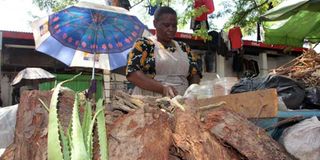Researchers concerned over wrong prescription to cancer patients by herbalists

A herbalist arranges her products in readiness for sale at Jubilee Market in Kisumu. Researchers are concerned that most herbalists in Africa have been giving wrong drugs to cancer patients. PHOTO | TONNY OMONDI | NATION MEDIA GROUP
What you need to know:
- Dr Mandlhate said that most of the cancer patients first seek treatment from traditional herbalists before visiting hospitals.
- She said that most of the cancer patients first seek treatment from traditional herbalists before visiting hospitals.
- Prof Ngoma from Tanzania defended the group saying they should be incorporated in the cancer treatment programmes and training.
- Dr Elizabeth Ogaja, the Kisumu County Health executive, said the healers had complicated cancer treatment.
Traditional herbalists have been blamed for the increase in the spread of cancer in Africa.
This was revealed during a cancer awareness workshop in Nairobi Tuesday where traditional healers were accused of giving wrong drugs to patients.
Researchers Custodia Mandlhate, Emmanuel Luyirika and Tualibu Ngoma said they were concerned that most patients sought treatment in hospitals when the disease was at an advanced stage.
Dr Mandlhate, the director of World Health Organisation-Kenya said more studies should be conducted to verify the credibility of the herbs used.
“To validate the effectiveness of drugs administered, we need to do more research on the components used by the traditional healers,” she said at the 9th Stop Cervical Breast and Prostate Cancer in Africa in Nairobi.
Dr Mandlhate said that most of the cancer patients first seek treatment from traditional herbalists before visiting hospitals.
Dr Luyirika, the executive director of the African Palliative Care Association, said research showed that South Africa and Uganda led in the number of herbalists in the continent.
“The two countries have found a way of using the traditional healers on palliative care,” he said.
DEFENDED THE HEALERS
However, Prof Ngoma from Tanzania defended the group saying they should be incorporated in the cancer treatment programmes and training.
“Most patients seek assistance from traditional healers because they have faith in their drugs,” he said.
He said that in Tanzania, all the herbalists were registered.
“Registering them does not mean that we believe in what they are doing, but it helps us separate them from quacks,” he said.
“They may not have knowledge on what they are treating but by registration we consider knowing what they are using for treatment.”
Prof Ngoma’s sentiments were supported by Ms Anne Kori, of Kenya Medical Research Institute who called for regulation of the healers.
“Most of our patients have faith in their herbs. We have begun testing the components of the herbs in our laboratories. Some are however quacks out to make money,” she said.
Dr Elizabeth Ogaja, the Kisumu County Health executive, said the healers had complicated cancer treatment.
“Fighting cancer has been a problem because these traditional healers give patients different advice from what they are told in hospitals,” she said.




